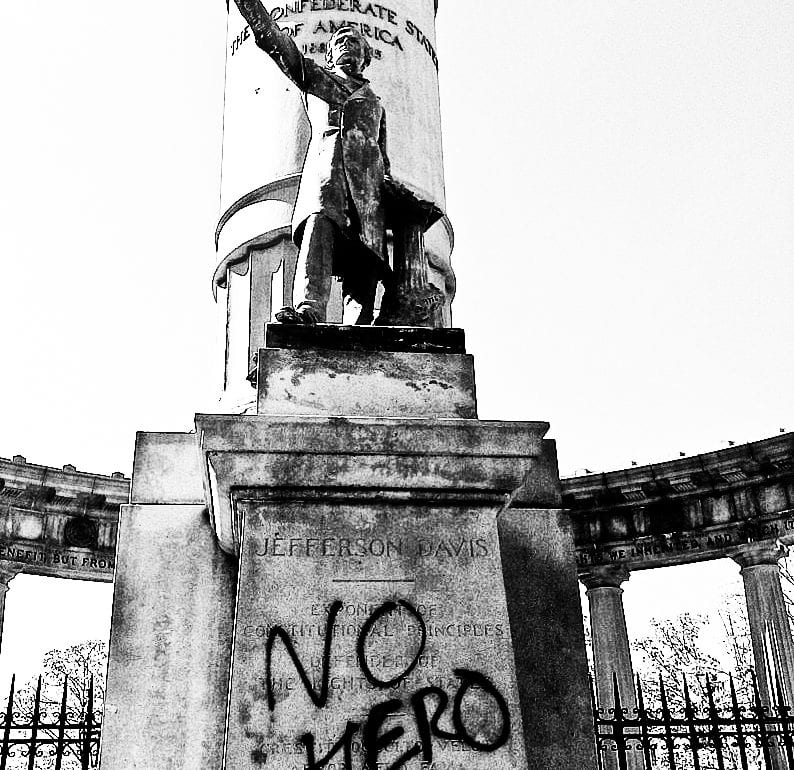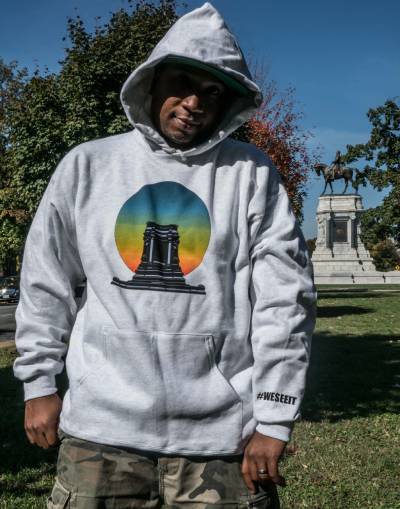THE POLITICS OF CONFEDERATE MONUMENTS IS VEXING. LOCAL CONTROL IS AN IMPERATIVE FIRST STEP

One thing about Richmond is that we often talk about taking bold action to move beyond our racist history and forge a new identity that is rooted in just about anything besides our divisive past. But this is Richmond where the talk flows freely, and, as for the bold action? Well, that is much harder to come by.
I have always considered local control over Confederate monuments low hanging fruit when it comes to moving Richmond into a promising and optimistic future. Giving localities like Richmond the option to remove Confederate iconography from places like Monument Avenue and relocate them to private cemeteries or history museums is an appropriate course of action that takes bold action but also allows those who chose to commemorate the Lost Cause to do so mostly independent of taxpayer dollars.
I understand that my opinion on this issue is not shared by all who reside in Richmond (or Virginia, for that matter). And, I am certain that my opinion is in the minority to the majority of those who currently own property on Monument Avenue. You’ll hear just about everything from residents of the famed 2nd District street as to why Monument Avenue needs to stay how it is: The art is historic and beautiful. The monuments have been here forever. Our property value will plummet if they are moved. You’ll hear everything except for anything to do with race, white supremacy and maintaining the myth of the Lost Cause because Richmond is so beyond that in 2020.
Last November’s special election in the 5th district highlighted some very telling exit polling. Informal exit polling indicated that the top two issues that moved people to vote in the 5th were public school improvement (i.e. school funding) and safer streets (safety when walking, biking or taking the bus). The pending Navy Hill project was on voters’ minds but well behind the top two and nowhere to be found was the issue of Confederate monuments.
Now, is that because voters don’t care about the fate of Confederate monuments in Richmond? I tend to think of it more like the adlib from the Black Star song “Brown Skin Lady,” “I’m a victim of 400 years of conditioning/Even my conditioning has been conditioned.” In many ways, we’ve been programmed to believe that since this is how Richmond is, this is how Richmond should remain. However, recent history has proven that change can take place in the 2nd District – on Monument Avenue – and the sun still rises in the East. The naming of Arthur Ashe Boulevard and the arrival of Kehinde Wiley’s Rumors of War at the VMFA both took place just last year.
The Ashe Boulevard name change brought out its fair share of detractors – most of them used similar arguments as Monument Avenue defenders do now: historic identity. However, championed by 2nd District Councilwoman Kim Gray and a very organized effort from Ashe’s nephew David Harris and the Arthur Ashe Boulevard Initiative the measure to rename the Boulevard passed RVA Council on a vote of 8 to 0, with only Reva Trammell abstaining to vote in favor (a truly inexplicable move). While Gray, who has been in speculation for a possible run for Mayor, was a leader on the renaming of Ashe Boulevard and has recently been rallying major support for a new monument on Monument Avenue honoring African-American heroes in the Battle of New Market Heights, Gray has voted against and spoken out against any plans to remove Confederate monuments from Monument Avenue.
Gray was the only Black member of City Council to vote against local control of monuments in October of 2018. Other Council members voting against the measure were: Andreas Addison (1st District), Chris Hilbert (3rd District), Kristen Larson (4th District), Reva Trammell (8th District), and Parker Agelasto (5th District), who was replaced by Stephanie Lynch who has stated that she plans to vote in favor of the measure. Gray continues to call local control of Confederate monuments “divisive.” She also has indicated that she believes the measure, introduced now for a third time in 25 months by 9th District City Councilman Mike Jones, is a political stunt (a charged that I’ve heard echoed by some grassroots activists who have worked on this issue long before Jones took office in 2016).
Whether Jones is playing politics or not, Gray’s positioning is clearly one that balances her core beliefs with political strategy. She represents the 2nd district (home of Monument Ave – and a large portion of her donor and political base). She will have to determine if this issue presents a possible liability with black voters in a possible mayoral bid. Just a quick reminder, in order to win the office of mayor on election day, a candidate needs to win 5 out of 9 districts. The current Mayor, Levar Stoney, delivered on 5 out of 9 in 2016 by winning Gray’s district of the 2nd (mostly due to VCU voters), 3rd, 5th, 6th, and 7th. Any challenger that runs against Stoney in 2020 has to wrestle some districts away by attacking him on schools, housing, and the possible fate of Navy Hill. It remains to be seen how Monday’s vote on local control of confederate monuments could possibly play into the 2020 Mayor’s race but my guess is that any candidate who is opposed to this measure will have to explain it to black voters all across the city.
While it is easy to single out Gray, she was joined in her opposition by every white member of RVA Council. None of them should get a pass because they are white. White people have a responsibility to dismantle white supremacy.
During the October 8, 2018, City Council meeting, in which the measure failed 6-3, Kristen Larson stated that she believed the measure to control 5 Confederate monuments in our city was not in the spirit of the Monument Avenue Commission report to remove one statue: Jefferson Davis. Andreas Addison echoed her words and went as far as to say if the measure was to just remove Davis, he’d vote for it. Larson also stated that the state delegation was already burdened with 5 challenging requests from the City Council and adding the monument request would dominate the agenda. Council President Chris Hilbert gave a speech stating that the Civil War was indeed about slavery. And that, he believed Confederate monuments would not be in Richmond in 50 years. However, he was not voting in favor of the measure because that would be the easy thing to do while combating our wealth gap is where the hard work lies.
The failed monument vote of 2017 provided Council members some political cover because the aforementioned Monument Avenue Commission hadn’t completed their assigned work at that time. However, the Commission issued its final report in July 2018 and recommended changes to Monument Ave, including the removal of the Jefferson Davis monument, along with the addition of permanent signage, exhibits, a mobile app, and the addition of new works. The October vote seemed to fail because the General Assembly, with the House and the Senate controlled by Republicans, was not in a position to pass any measure granting localities local control and, according to the majority of no votes, adding a monument request at that time would only cloud the city’s priorities. Well, last November, the General Assembly flipped to Democratic control and the Governor has stated that he supports the local control of Confederate statues.
Council is scheduled to take up another vote on the local control of Confederate statues on Monday. It will be its third vote in 25 months. However, this is the first vote where there is virtually no political cover for RVA Council members.
The truth is whether you’re for completing the actions of the Monument Avenue Commission – which includes the removal of the Jefferson Davis statue – or for removal of all Confederate statues altogether – the very first step is asking the General Assembly for local control.
If RVA Council fails to do so, I think it’s fair to question how sincere this Council is to the promise of taking bold action to move us beyond our racist history.
Before Dr. King’s assassination in 1968, he gave an interview to NBC in which he stated that he was naïve in thinking that integrating buses and lunch counters were major victories in the fight for black equality and civil rights. He stated that, in hindsight, that those so-called major victories were just needed stepping stones to the much harder task of economic justice.
In the closing speech before the monument measure failed in October ‘18, Council President Chris Hilbert essentially stated that voting in favor of the paper would be the “easy” thing to do. He stated that Council could vote in favor of the measure, feel good about themselves, and call it a day instead of taking of the much harder task of the wealth gap that plagues our city.
I’m going to close this column with the argument that local control of city monuments is just a needed step to dismantling white supremacy and charting a new course in Richmond. It’s not going to replace the harder work of education and economic justice. BUT it’s the least that can be done. And if this Council is not capable of getting the easy stuff right, there is no way they should be trusted to tackle the much harder work.







 The Cheats Movement is dedicated to hip-hop culture, politics, and community activity. We see our community different than most, therefore, #WESEEIT
The Cheats Movement is dedicated to hip-hop culture, politics, and community activity. We see our community different than most, therefore, #WESEEIT
Leave a Comment